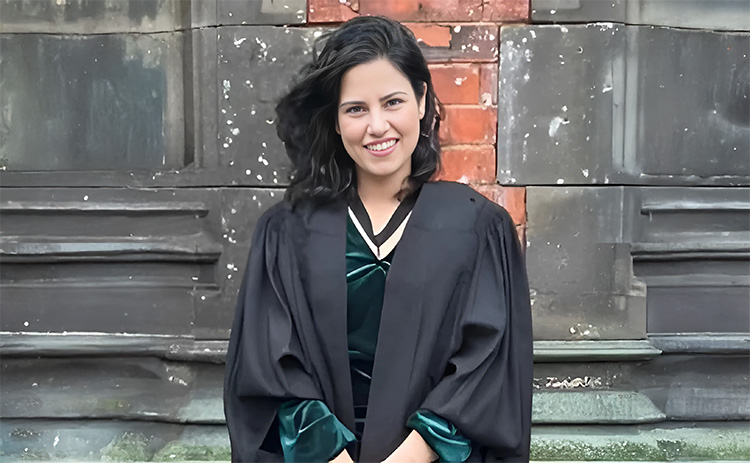Sanjana Arora
2023 MBA graduate Sanjana is Enterprise Risk Manager at Funding Circle UK in London, UK.
Interview
What is your current role, and did you change roles once you completed the Newcastle University MBA?
I am currently working as an Enterprise Risk Manager at Funding Circle. Prior to this, I held roles as an Assistant Operational Risk Manager and Lead Business Analyst within operational risk functions, primarily in first-line risk management.
After completing my MBA, I transitioned into a second-line role, gaining a more strategic perspective on enterprise-wide risk. The MBA experience significantly broadened my understanding of how businesses operate, particularly through hands-on consultancy projects in the Business in Action modules. These practical experiences enabled me to approach challenges with a more holistic and commercially aware mindset. The MBA also equipped me with essential transferable skills, including project management, stakeholder engagement.
How did the MBA support you in successfully navigating your career post-graduation?
The Newcastle University MBA is a dynamic and comprehensive programme that offers exposure to a wide range of industries and business functions.
The MBA specifically enhanced my critical thinking and strategic decision-making skills through a variety of individual and group projects. These projects simulated real-world challenges and required me to apply theoretical knowledge in practical, time-sensitive situations.
Additionally, the collaborative nature of the coursework helped me develop essential soft skills such as teamwork, communication, and adaptability—qualities that are critical in navigating complex business environments.
What skills do you think the Newcastle University MBA has strengthened or equipped you with?
The MBA has significantly strengthened my critical thinking skills, encouraging me to question assumptions and challenge the status quo constructively. It has taught me to approach problems from multiple perspectives and make informed, strategic decisions under pressure.
One of the most valuable lessons from the programme was the importance of maintaining an open-minded attitude in the workplace, both as a manager and as an individual contributor. Through diverse group projects and cross-functional collaboration, I learned how to listen actively, adapt to different viewpoints, and lead with empathy and inclusivity.
These skills have been instrumental in my professional growth and continue to shape how I engage with stakeholders and drive outcomes in my current role.
As an international student, how have you found transitioning to the UK job market, and do you have any tips for those thinking of doing the same?
Transitioning into the UK job market as an international student was challenging, and it continues to become increasingly competitive. However, with the right support and approach, it is possible to navigate it successfully.
I strongly recommend making full use of the University’s career services early on. Throughout my journey, the support and guidance from Cian O’Sullivan, Career Consultant at the Business School, were invaluable in helping me stay focused and prepared.
It’s important to continuously improve your CV, tailor it for each application, highlight relevant experience, and leverage AI tools to refine your content and strategy. Equally, invest time in building strong, structured examples for common interview questions. Preparation and practice are key to building confidence and standing out.
How have you developed your professional networks and why have these been important to your development?
I have primarily developed my professional network through LinkedIn. For me, the focus has always been on quality over quantity. It’s important to approach people with a clear purpose and well-defined objectives. Connecting with university alumni in similar fields can be especially valuable, and I encourage others not to hesitate in reaching out; even if only a small percentage respond, it can still lead to meaningful connections.
Building and maintaining a network requires consistent effort. It’s about developing a personal brand rooted in your values, whether as a colleague, employee, or peer. That brand becomes your unique identity and is key to long-term professional growth.
In my experience, meaningful networking often begins once you enter the job market. Engaging in one-on-one conversations, highlighting your skills, and being visible in your field can open doors to opportunities that may not be advertised publicly.
As a Newcastle University MBA graduate, what piece of advice would you give to students to prepare them for success?
My key advice to MBA students is to fully engage with the programme and stay committed to the learning process. Complete your readings, participate actively in discussions, and take ownership of your development journey—both personally and professionally.
While AI tools can be a valuable aid, avoid becoming overly reliant on them. Use them to enhance your work, not replace critical thinking or original insight. Throughout your studies, take time for self-reflection. Maintain notes on your progress, challenges, and key takeaways. This habit not only helps you identify areas for improvement but also equips you to articulate your growth clearly in interviews and professional settings.
Ultimately, this mindset will position you as a strong candidate in the job market and a valuable asset to any organisation you join.
As an Enterprise Risk Manager, how are geopolitical tensions, climate change, or cyber threats influencing your risk strategy?
As I transition into the strategic side of risk management, staying informed about global developments has become essential. Geopolitical tensions, climate change, and cyber threats require us to think beyond traditional risk models and approach challenges with a broader perspective.
I am trying to read more about internal risk management, and I am aiming to bring in the external perspective by seeking the best ways to adopt industry best practices within my company to the best of my ability.
Take ownership of your development journey—both personally and professionally.

